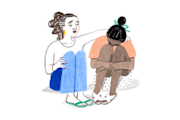Explore family issues topics
Family issues
The American family structure is changing: Cohabitation is on the rise, more people are postponing or foregoing marriage, a rising number of children are live in a household with an unmarried parent, and same-sex marriage is now legal in all 50 states.
These changes, coupled with other problems that families often encounter such as issues with addiction or mental health, can have a huge impact on the family's dynamics.
Whether you’re looking for information on how to support yourself and your child, where to get help for your family, or how to handle parenting and mental illness, you can find helpful resources below.

Family challenges
Most families face difficulties at some point. People are highly emotional beings, so disagreements and confrontations are inevitable. Each person has their own set of values, views, reactions, and thoughts. When you put several people with differing views and ways of thinking together, some conflict naturally arises.
However, families can learn to cope with and overcome difficult situations and conflicts.
Some common family problems include:
Adoption
Addiction
Blended family issues
Custody disputes
Parenting disagreements
Finances
In addition, the stresses of modern-day life, from financial strain to the pressure on kids to perform academically, creates additional difficulties for many families.
Keep reading to learn more about common family issues and how counseling can help.
Common family issues
It's important to remember that conflicts are typical. Family dynamics often create conflicts that lead to stress and difficulties in getting along.
For example, many families struggle with adoption, blended family issues, custody disputes, and parenting disagreements. What keeps families functioning well is the ability to manage and resolve these conflicts.
Addiction
For many family members of addicts and alcoholics, getting them into addiction and alcoholism treatment may seem to be the last step in a process that has lasted months, if not years.
For many family members of addicts and alcoholics, getting them into treatment may seem to be the last step in a process that lasted months, if not years.
The bad news is that it isn't. Those who seek treatment for a drug or alcohol addiction often leave a trail of devastation, ranging from unpaid financial obligations to legal ramifications to the overall turmoil and chaos that is a part of their lives.
On top of all that, many family members must deal with their own problems with addiction. The good news is that the majority of reputable drug and alcohol treatment programs know the important role the family plays-not only for addicts and alcoholics, but also for their loved ones.
Involving family members in the process not only helps in the healing of strained and broken ties, but it also increases the chances of addicts and alcoholics staying clean and sober in the long run.
Adoption
It's estimated that adopted children make up 2% of those under age 18 years living in the U.S. When compared to their non-adopted peers, adopted children may have more mental health issues.
For many children, adoption can can result in a positive outcome. However, thousands of other children in adoptive families may experience trauma from living with a negligent or abusive family.
Even when adopted into loving families, children may have mixed emotions about being given up for adoption. When a child tries to make sense of why they were given up for adoption, it can lead to widespread feelings of inadequacy. Adoptive children may also experience anxiety as a consequence of not knowing their biological parents.
Many unprepared parents lack the finances or are simply unable to properly care for a child. They place a child for adoption, hoping to provide them with a better quality of life.
Other children are placed in foster care when Child Protective Services removes them from a negligent or abusive family setting. Some go into loving and supportive foster families for an extended period, while others bounce from foster home to foster home or live in institutions or group homes until they reach adulthood.
Even in happy households with loving and caring adoptive parents, children may wonder about their biological family and imagine what their parents and siblings could look like. This may result in behavioral problem and hostility directed toward the family.
Adoption may also create havoc among the other family members. For instance, in today's society, both parents usually work. One partner's career may be very time-consuming, leading to the other partner shouldering the burden of childcare on top of other responsibilities.
As a result, the parent who must work and be the primary caregiver often experiences burnout from a cramped schedule. In these cases, finding ways to help each other rather than arguing over who bears which responsibilities is essential.
The good news is that these and other problems are often addressed in therapy.
Blended families
Blended families also face unique challenges. A common issue centers on disciplining children. Children usually miss the non-custodial parent and may resent having to obey a stepparent.
In addition, their natural mother or father may have raised them differently than their stepmother or stepfather, which can lead to conflicts. The ability of the custodial parent to help create a positive environment where the child can adapt to new circumstances often helps blended families create productive dynamics.
Custody disputes
Custody disputes lead to emotional and financial distress for the parents and often leave children feeling torn between warring parents and guilty, as if the family breakup was their fault. Children must see that both their parents love them and that the custody dispute is in no way their doing.
Parenting disagreements are some of the most common familial conflicts. Both partners have their own values and backgrounds. One parent may feel that children need stricter discipline, while the other sees that attitude as a way of stifling their children's spirits.
While neither of these beliefs is inherently right or wrong, parenting disagreements often lead to partners resenting the other's actions or inactions and arguing without understanding the other's point of view. It's okay for each parent to have a different style. The ability to work together for the benefit of the children is what matters.
Top problems facing families today
The world has changed dramatically in the past few decades. As family roles have shifted, so have the economic situations of most families and the expectations placed upon children and teens.
With both parents usually working and most Americans living paycheck to paycheck, financial stress has become a significant problem facing families today. Debt often becomes a mounting problem that makes this stress far more difficult to bear.
Talking openly about money and creating a plan to achieve financial security and peace of mind helps partners enhance communication, find a common purpose, and avoid misunderstandings and resentments that may cloud family life.
Getting into college used to be simpler, but increased competition has many students stressing out about falling behind and failing to meet expectations. While parents struggle to deal with financial stresses, children and teens face increasing pressure to perform academically and excel in extracurricular activities.
This pressure often leads to parents placing high expectations on their kids, making students feel overwhelmed and inadequate. The result is often resentment within families as parents and their children disagree over future plans.
The best ways to deal with family issues
Every family has issues. Often, open communication, mutual respect, and spending time together helps families cope with struggles and become a stronger unit.
However, many difficulties, such as constant arguments, mental health challenges, and substance abuse, respond well to family counseling.
Family counseling
The purpose of family counseling should always be to build a strong, healthy environment. Counseling sessions may include some or all members of the family. The needs of each family differ.
Some benefits of family counseling include the following:
1. Improved communication
Family counseling overcomes communication blocks. Part of the goal of this type of therapy is to help everyone in the family communicate better. For most families, communication is an essential foundation for addressing other issues.
For instance, when new parents struggle with dividing childcare responsibilities, communication provides the route to understanding and compromise. Communication is also a key component of blended family relationships. Blended families must overcome unique challenges, and communicating these helps families become stronger.
2. Support for substance abuse treatment
When a family member suffers from substance abuse, family counseling can provide a safe environment for other family members to learn how to support recovery.
3. Building stronger bonds
Through family therapy, members learn to listen and empathize more fully, gaining a better understanding of the wants and needs of others. Adoption often comes with challenges in understanding the feelings and needs of new family members. Family therapy helps to increase empathy and build stronger bonds.
4. Managing mental health conditions
Chronic mental health conditions amongst family members often improve with family counseling. Conditions such as depression, anxiety disorders, and self-harm all respond to this type of therapy.
5. Dysfunction
Family counseling is built on the premise of families learning to understand and overcome dysfunctional dynamics. The counseling environment provides families a productive space to share feelings and learn communication skills.
For example, custody disputes are a major cause of family dysfunction. Counseling helps parents and kids overcome negative emotions and work towards solutions that provide the best environment for children.
Families face many challenges, ranging from interpersonal dynamics to financial stresses to substance abuse. Many families try to deny problems, only to have them grow worse. When difficulties threaten family life, it is essential to confront them.
Family counseling provides a safe space where family members can communicate honestly and learn to support each other through life's trying times.



